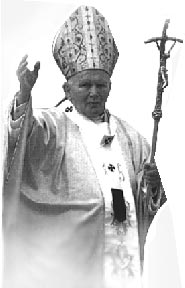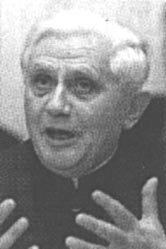

![]()
![]()
|
Newsletter of the District of Asia September-October 1999 
II. Message of Pope John Paul II To Cardinal Joseph Ratzinger November 30, 1996 The following message which appeared in L’Osservatore Romano dated December 2 & 3, 1996, page 8, should be read in conjunction with Bishop Fellay’s subsequent letter regarding the“Primacy of Peter”.
To
our Venerable Brother It is my ardent wish, Your Eminence, to express to you my gratitude for the initiative the Congregation for the Doctrine of Faith, of which you are the president, has taken to organize a Symposium on the theme “The Primacy of the Successor of Peter” – with the collaboration of many distinguished experts and researchers. Allow me to hereby extend and express sentiments of gratitude to all these illustrious participants for their availability and their zeal. In the Encyclical, Ut Unum Sint, I acknowledged that “It is significant and encouraging that the question of the Primacy of the Bishop of Rome has already, or will become, a subject of study. It is equally significant and encouraging that this question is an essential theme, not only in the theological discussions that the Catholic Church holds with the other Churches and Ecclesial Communities, but also more generally in the whole of the ecumenical movement.” (Ut Unum Sint, no. 89) The Catholic Church is aware of having retained, with fidelity to apostolic tradition and to the faith of the Fathers, the ministry of the Successor of Peter, whom God constituted as the “perpetual and visible principle of unity, and its foundation” (Lumen Gentium, no.23). Such a service of unity, founded upon the work of divine mercy, is a gift which is conferred, within the college of Bishops, to the Apostle Peter in his role as Bishop of Rome. The power itself, and the proper authority of this ministry, without which such a function would be illusory, must always be seen in the perspective of serving God’s merciful designs, Who wills that we all be “one” in Christ. In this regard, the primacy is exercised at different levels, such as in the service of the unity of Faith, or in vigilance over sacramental and liturgical celebrations, missions, Christian life and discipline. However, one must realize that all this must always be done in communion. At the same time, one must stress that this service of the unity of Faith and of the Church, inasmuch as this comes forth from the Petrine ministry, is a means and an instrument of evangelization: in such a way that the new evangelization is linked to the testimony of the Church’s unity, of which the Successor of Peter is a visible sign and a guarantee. On the other hand, as I stated on the occasion of the meeting with the Ecumenical Council of Churches in Geneva, in June of 1984, this conviction of the Catholic Church “constitutes a difficulty for most other Christians, whose memories are marked by certain painful remembrances”. Thus, for the sake of our preoccupation with unity, which plays an essential part in the role of the Primacy, I have expressed in the Encyclical, Ut Unum Sint, the conviction that “I have a particular responsibility in this regard, especially when I observe the ecumenical aspirations of the majority of Christian Communities and when I hearken to the request addressed to me, to find a form of exercising the Primacy, open to new situations, but without renouncing anything essential to its mission” (Ut Unum Sint, no. 95). At your Symposium, the zeal of the researchers, who are experts in various branches of theology – biblical, historico-theological, systematic – testifies to the rigor and competence of the research in the various spheres of theological knowledge, which, according to the doctrinal basis at which the researchers meet, intends to offer an important contribution to the service of theological dialogue; namely by indicating the essential doctrinal elements of the Catholic Faith on this aspect of ecclesiology, and distinguishing them from legitimately disputed questions, or those not definitively settled. This particular characteristic, far from constituting a difficulty for this ecumenical dialogue, represents a necessary condition for it, because it is an instrument to recognize divine truth. (…)
* * * Extracts from Cardinal Ratzinger’s Opening Address at the Symposium, a few days after the above Papal Message, on December 2, 1996. 3.
(…) Our symposium's purpose is ‘to explain and clarify the Thus the nature of the symposium is also evident. It does not wish to be merely theological-academic, in the sense that it does not intend to settle beforehand the goal of analytically exploring the whole status quaestionis of the matter, nor does it intend fully to compare and contrast Catholic theology and the positions of the non-Catholic Christian confessions. As has been emphasized in the explanatory note distributed to all participants, the symposium is characterized by its properly doctrinal nature, aimed at extracting the essential points of the substance of the doctrine on the Primacy, according to the Catholic Church's conviction of faith, indicating at the same time the problems legitimately open to theological discussion. It is not the symposium's objective however to deal with them specifically. 4. (…) After attentive examination, it was decided to divide the study meeting into three sessions: - In the first, attention will be dedicated to the dogmatic meaning of the primacy of the Successor of Peter and its transmission. - In the second, the theme of the relationship between primacy and collegiality. - In the third, the nature and aim of the primatial interventions of the Bishop of Rome concerning the particular Churches will be described. 5. (…) it is even logical that the interpretation of faith cannot be indisputably imposed on the historian. What is essential however is that such an interpretation should not be excluded from the facts. (…) 6. Lastly, the importance of the theme for ecumenical discussion cannot be ignored. It is true that the symposium does not intend to make a theological comparison of the different viewpoints of the Christian confessions, as would be the case with an ecumenical colloquium. On the other hand, it is quite obvious that the question of the Primacy of Peter and its continuation in the Bishops of Rome is one of the most burning issues in ecumenical dialogue. And it is precisely the awareness that at the center of theology lies the question of truth, which obliges us to place the service of truth as the basis and goal of the search for Christian unity itself, without prejudice and in obedience to the Lord. The invitation extended to Prof. Pannenberg and Prof. Chadwick to come to our symposium as representatives of the Lutheran and Anglican confessions (unfortunately Prof. Clement was unable to take part due to unexpected illness) attest to the interest with which the Catholic Church looks to a greater and ever deeper knowledge of the positions of non-Catholic Christians even on this particularly difficult topic. For Catholics, criticism of the papal primacy by other Christian brothers and sisters is like an earnest request to carry out the Petrine service in a way which is more and more in conformity with Christ. In turn, for non-Catholic Christians, the Roman primacy is a permanent and visible challenge to concrete unity, which is a task of the Church and must be her distinguishing mark before the world. (…) (In ‘L’Osservatore Romano, Jan. 1, 1997)* * * Short comments: Notice, in No.3, the division between the ‘substance of the Divine Institution’ and the ‘concrete forms or expressions of its exercise as historically practiced in the past two millenniums’. Also, the separation between Faith and History, in No.5. We could apply St Pius X’ s condemnation of the modernistic distinction of “the Christ of Faith and the Christ of History” to the Church – the Church of Faith, and the Church of History. Finally, in No.6, the primacy is indeed ‘one of the most burning issues in ecumenical dialogue’. So, the Cardinal tells us after the Pope himself, let us see how much we can change of it for the sake of ecumenism, rather than invite the non-Catholics to accept the Catholic teaching so clearly defined in Vatican I. |

 indispensable
elements of the doctrine on the primacy of the Successor of Peter,’
taking into account the principle, also mentioned in the Letter
of the Congregation for the Doctrine of the Faith, Communionis
notio, to the Bishops of the Catholic Church on some aspects
of the Church understood as communion, that it is necessary to distinguish
in the Petrine ministry the substance of the divine institution
from the concrete forms or expressions of its exercise as historically
practiced in the past two millenniums (cf. n. 17).
indispensable
elements of the doctrine on the primacy of the Successor of Peter,’
taking into account the principle, also mentioned in the Letter
of the Congregation for the Doctrine of the Faith, Communionis
notio, to the Bishops of the Catholic Church on some aspects
of the Church understood as communion, that it is necessary to distinguish
in the Petrine ministry the substance of the divine institution
from the concrete forms or expressions of its exercise as historically
practiced in the past two millenniums (cf. n. 17).